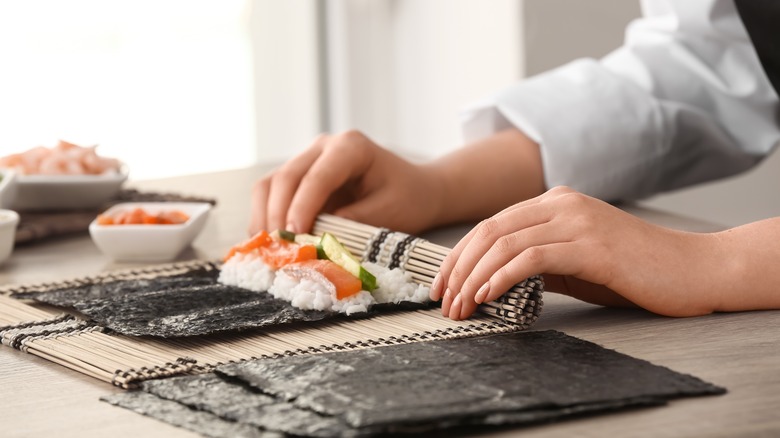Avoid Eating Sushi If You Have This Medical Condition
Sushi used to be one of those delicacies only found in Japanese restaurants, but now you can find sushi in grocery stores and convenience stores. Depending on the type of sushi you choose, more than likely you'll be getting healthy nutrients from fish, vegetables, and rice. A California roll provides heart-healthy fats from avocado, and the protein in a tuna roll will keep you full. That pickled ginger and sinus-clearing wasabi have antioxidants that can stamp out inflammation. The best choice for sushi is filled with brown rice for healthy carbs and soluble fiber.
Some sushi isn't so healthy, such as those choices with artery-clogging mayonnaise and cream. You might feel somewhat safer eating the cooked tempura, but the oils and sodium used in the frying process make these choices unhealthy. Even if you choose the healthier types of sushi, some people can't eat sushi because it's rich in iodine. Iodine is an important nutrient to support thyroid hormone production, so people with Graves' disease should avoid sushi.
Why those with Graves' disease should avoid sushi
People with Graves' disease have an overactive thyroid, which means the thyroid gland makes too much of the thyroid hormone. This results in weight loss, rapid heartbeat, nervousness, or heat intolerance. Graves' disease can also make your eyes more sensitive to light or affect your vision. People with this autoimmune disorder might also develop reddish or thick skin.
A single sheet of nori, which is the seaweed used to make sushi rolls, provides 70% of your daily iodine needs. Just a few sushi rolls can give you more than what you need to help your thyroid. However, people with Graves' disease should avoid foods rich in iodine because it exacerbates their hyperthyroidism. Seafoods such as cod and oysters are also rich in iodine. Other foods rich in iodine include nonfat milk, Greek yogurt, and eggs. Table salt is often enriched with sodium iodide because the body cannot make this mineral, so people with Graves' disease should choose salt that is free from iodide.
Other things besides sushi to avoid with Graves' disease
Amiodarone, which is a medication that treats an irregular heartbeat, has iodine and should be avoided if you have Graves' disease. Some cough syrups might contain iodine. Check the labels of your vitamins and supplements to see if iodine has been added. Many greens powders might add kelp or dulse for added nutritive value, so these should be avoided. Soy doesn't have iodine, but eating too much soy could interfere with iodine absorption. You also might want to stay away from caffeine because it aggravates some Graves' disease symptoms such as a rapid heart rate and nervousness. Foods that have gluten might pose a potential food allergy.
Some foods can help reduce how iodine is processed in the body, such as cauliflower, broccoli, kale, and other cruciferous vegetables. Selenium supports a healthy thyroid gland, and unsaturated fats like olive oil or avocado regulate your thyroid hormone. You'll also need some minerals to protect against hyperthyroidism. Zinc preserves your cells from damage due to an overactive thyroid, and calcium and vitamin D will keep your bones strong. Women who are menstruating will need to keep their iron levels in check because hypothyroidism could cause extra loss of blood.



